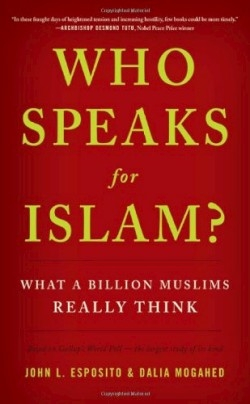Who Speaks for Islam?
What a Billion Muslims Really Think
There are inherent difficulties in understanding what people within other cultures believe. This is especially true when it comes to American perceptions of the world’s 1.3 billion Muslims. In Who Speaks for Islam?, Georgetown University professor John Esposito and the Gallup organization’s Dalia Mogahed try to expand mutual awareness by presenting a wealth of survey data about the Islamic world.
The book builds on the foundation of a long-term (2001-07) Gallup research study that, according to the authors, used a random sampling method to represent the beliefs of more than 90% of the world’s Muslims. The discussion of the data focuses on topics of wide interest to Western governments and publics alike: political beliefs, radicalization, religious views, and cultural matters (such as the role of women in society). Informed by Esposito’s scholarly expertise, the narrative avoids delving too deeply into esoteric issues, thus maintaining appeal for a more general audience than a purely academic tome. The authors explain basic facts about Islam to provide context for the data before citing the survey results and offering their interpretation thereof.
Some of the findings may shock readers. For example, a significantly higher percentage of politically radicalized Muslim respondents (as contrasted with politically moderate Muslims) agreed that “moving toward greater governmental democracy” would foster progress in the Islamic world—not the view of Muslim extremists portrayed in the mass media. Results from the other side sometime surprise, too. In one cited survey, nearly one-quarter of Americans say they would not want a Muslim as a neighbor.
Readers interested in raw survey data or Gallup’s research techniques will be disappointed; the results of the various questionnaires usually appear without supporting information and the appendix offers few insights into the genesis of the research project and questionnaire design. For the general reader, however, this is a good thing. The text flows well, offering only enough survey data to make a point without burying the message in tables of numbers or statements about statistical significance. Who Speaks for Islam? is a useful book with more than a few surprises about what Muslims—or at least certain subgroups of Muslims—believe about various political, religious, and societal issues.
Reviewed by
David Priess
Disclosure: This article is not an endorsement, but a review. The publisher of this book provided free copies of the book to have their book reviewed by a professional reviewer. No fee was paid by the publisher for this review. Foreword Reviews only recommends books that we love. Foreword Magazine, Inc. is disclosing this in accordance with the Federal Trade Commission’s 16 CFR, Part 255.

